Affiliate marketing is a powerful way to increase brand awareness and boost sales.
However, with more than 80% of businesses already using it (according to Rakuten), it’s no surprise that the market is crowded.
So, how do you make sure your brand stands out in such a busy space?
The good news is that you can make a real difference with the right affiliate marketing strategies.
Finding the perfect partners, creating special deals that grab attention, or using affiliate software platform to track and optimize performance—these are just a few ways to boost your product promotion and drive more sales.
Let’s dive in and discover which strategy is the best fit for your business!
TL;DR
Explore the top 10 best affiliate marketing tactics & real examples to drive more sales
- Choose the best affiliates for your brand
- Offer attractive commission structures
- Develop tailored programs for different affiliate groups
- Turn satisfied customers into your promoters
- Provide special offers with affiliate programs
- Leverage busy shopping seasons to increase sales
- Use giveaways to boost customer interaction
- Host contests to improve affiliate results
- Promote repeat buying with store credits
- Base your decisions on accurate data insights
Learn how to choose the perfect affiliate marketing strategy for your brand
With easy setup, attractive rewards, and robust tracking, UpPromote is the perfect tool for businesses of all sizes to grow their affiliate network and increase sales.
Top 10 Best Affiliate Marketing Strategies for Merchants to Boost Sales (+10 Examples)
Affiliate marketing offers new ways to grow your brand and boost sales. But remember, success doesn’t happen overnight.
Launching an affiliate program is just the beginning. To really thrive in affiliate marketing, you need to be strategic and use smart tactics to hit your goals.
Here are the top 10 affiliate marketing strategies that can help you run your campaigns successfully and see a real boost in your revenue:
Pick The Right Affiliates
Finding the right affiliates is key to your campaign success.
Your partners represent your brand and spread the word about your products or services. So, it’s important to team up with people who truly understand and connect with your brand and target audience.
To choose the best affiliate partners for your program, keep these things in mind:
- Who is your audience? Think about their age, location, and interests. Make sure your affiliates fit your target group.
- Which channels are your customers most active on – Instagram, Facebook, TikTok, or YouTube? Find out where your audience spends their time to kick off your recruitment plan.
- Find creators who produce high-quality, engaging, and relevant content. These are the folks who can really bring your brand to life.
- Seek out people with a strong online presence and good reputation. They should have high engagement, active social media profiles, and a loyal following.
- Do affiliates have a genuine interest in your products and share your brand’s values? They’ll be the ones who can represent your brand with authenticity and passion.
There are several ways to search for the ideal affiliates. Here are some common methods that you can consider:
- Attend industry events to connect with experts or influencers in your niche.
- Use Google’s search function to find potential affiliates who match your brand.
- Dig deeper on social media platforms, such as Instagram, Facebook, TikTok, and more. Search for keywords, hashtags, and phrases related to your niche to find potential accounts. Then, browse their profiles. Select those that fit your brand. Reach out to them to collaborate.
- Join affiliate networks or marketplaces such as ShareASale, UpPromote Marketplace, or CJ Affiliate. It gives you access to a large pool of potential partners eager to collaborate.
A real example to follow
If you run a beauty or cosmetics store, you might want to see how TréSkin gets it done. This popular organic beauty and health brand from the USA has some great strategies for finding top-notch ambassadors and boosting sales.
They mix things up by using social media platforms like Facebook, LinkedIn, and Instagram, along with third-party apps, to get their program noticed and connect with potential partners.
But they don’t stop there. They also tap into the UpPromote Marketplace to attract affiliates and discover the best influencers in their industry.
TréSkin enters the beauty niche on the UpPromote Marketplace, seeking out top affiliates with experience and a strong social media following. At the same time, they share their offer on the Marketplace, making it more likely for potential affiliates to come across and join the program. The more affiliates who apply, the better the chances for TréSkin to explore different profiles and find those who truly resonate with the brand.
After identifying the most suitable affiliates and placing them on the ideal list, TréSkin customizes separate programs for affiliates at different levels. They create offers tailored to their partners’ needs while providing the highest possible payouts.
Thanks to these affiliate-focused tactics, TréSkin has seen incredible results. In just one quarter of running a campaign through UpPromote, they saw strong sales growth with over $120,000 in affiliate revenue.

With over 20,000 affiliates active in UpPromote’s Marketplace, you have access to a huge pool of potential partners.
To find the perfect affiliates for your business, you have two great options:
- First, reach out to publishers directly in the UpPromote Marketplace:
For example, if you are a beauty store owner on Shopify, start by connecting UpPromote with your store. Next, navigate UpPromote’s marketplace > Find affiliates > Filter Beauty industry to explore affiliates.
You’ll discover a wide range of influencers who fit your niche. Take a look at their bios, industry experience, language, location, and social media presence. Once you’ve found your ideal ambassadors, invite them directly to join your program.
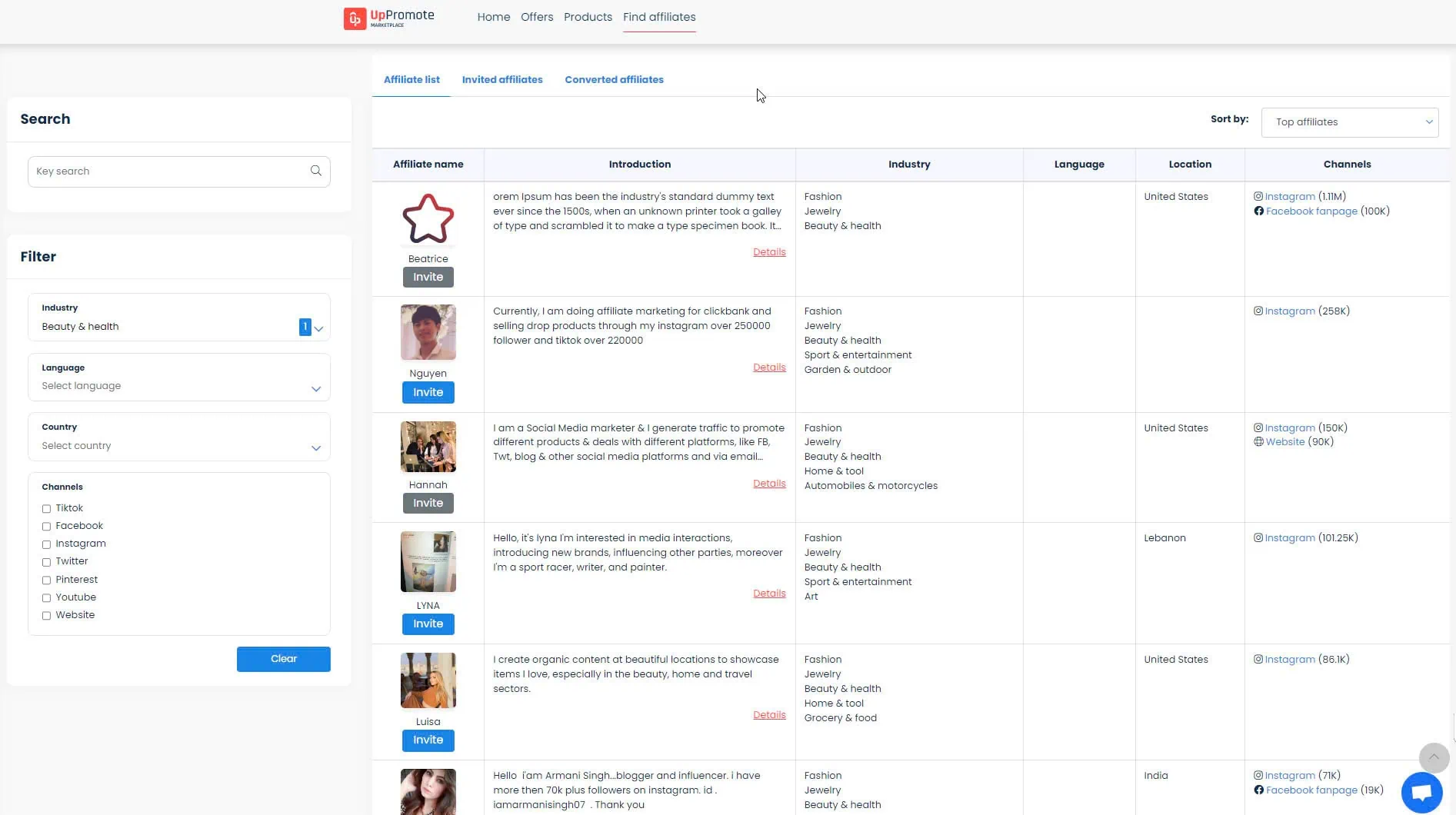
- Secondly, showcase your affiliate program on UpPromote’s Marketplace to attract interest:
Within our dashboard, go to Outreach > Marketplace listing > Edit offer.
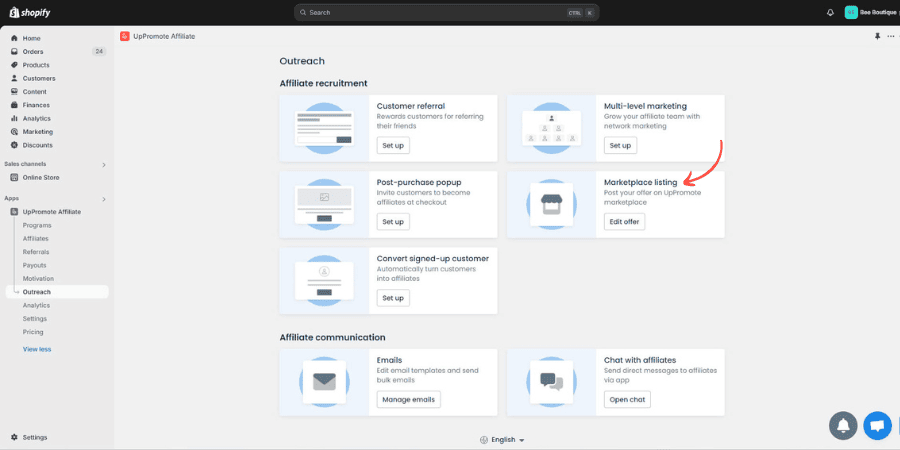
Next, choose the program to offer. Then, adjust your requirements based on your audience’s age, gender, and location. Also, consider their preferred promotion channels. This will help you attract affiliates who are a great match.
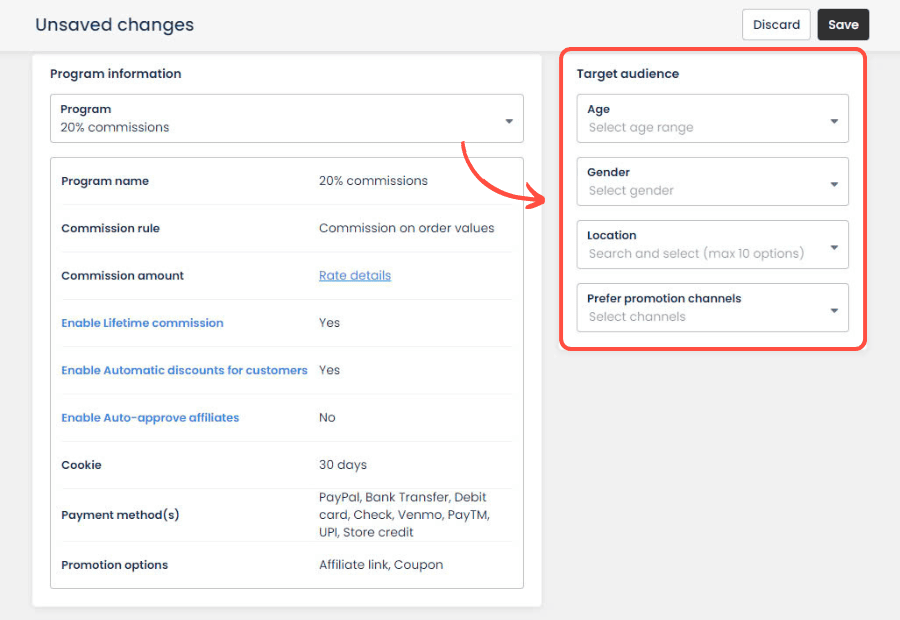
As you proceed, you can add more details about your brand. This includes your store domain, a banner, a description, geographic limits, hashtags, or even a video. This will make your offer stand out to the right publishers.
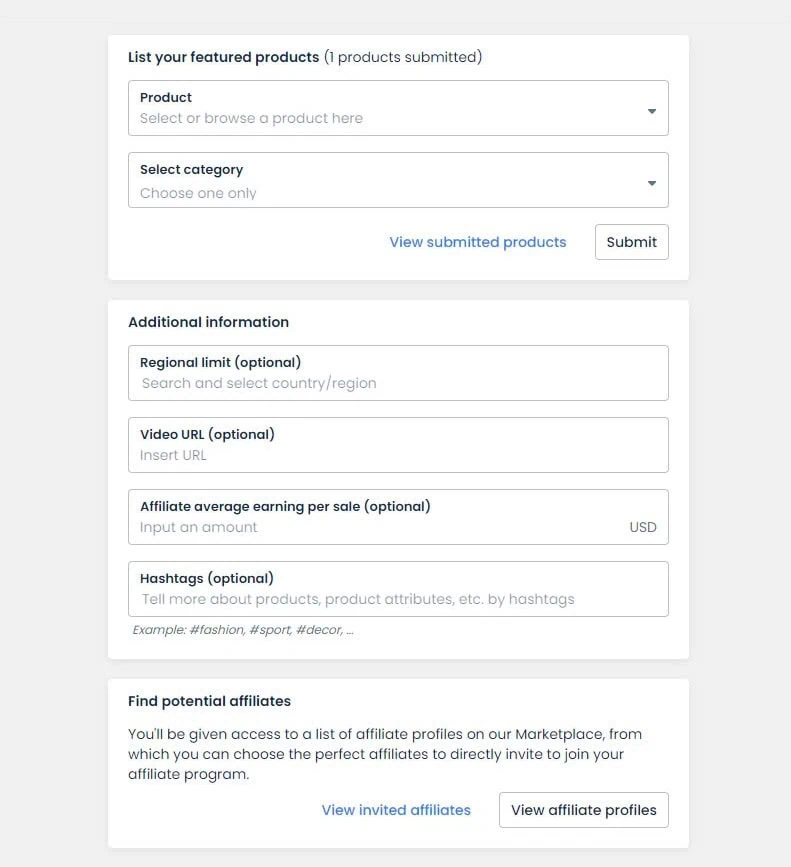
Create Lucrative Commission Rates
Now, you might have affiliates to team up with. But how can you get the most out of your partners to better promote products and drive more sales?
At the end of the day, money talks. Let’s be honest: affiliates want to make money. That’s the main reason they join your program.
Attractive commissions can really get affiliates excited about selling your products. They also serve as a ‘paycheck’ for their efforts. So, it’s important to offer competitive rates to keep them motivated to promote your brand.
Make sure your affiliate commission is at least as good as, or better than, your competitors’. This way, you can retain affiliates who will promote your brand instead of others.
If most brands in your niche with a similar price offer a 10-15% commission, a 5% rate might not attract top affiliates. In that case, consider lowering your commission or adding bonuses. This will help your program stand out.
To explore what competitors are offering, here are some tips for you:
- Check your competitors’ affiliate program pages for their commission rates.
- Join affiliate marketing communities and forums on Facebook, LinkedIn, or Quora. Browse discussions to learn about typical commission rates in your field.
- Visit affiliate networks like ShareASale, Rakuten Marketing, Impact, or Commission Junction. See how much other brands in your niche are paying.
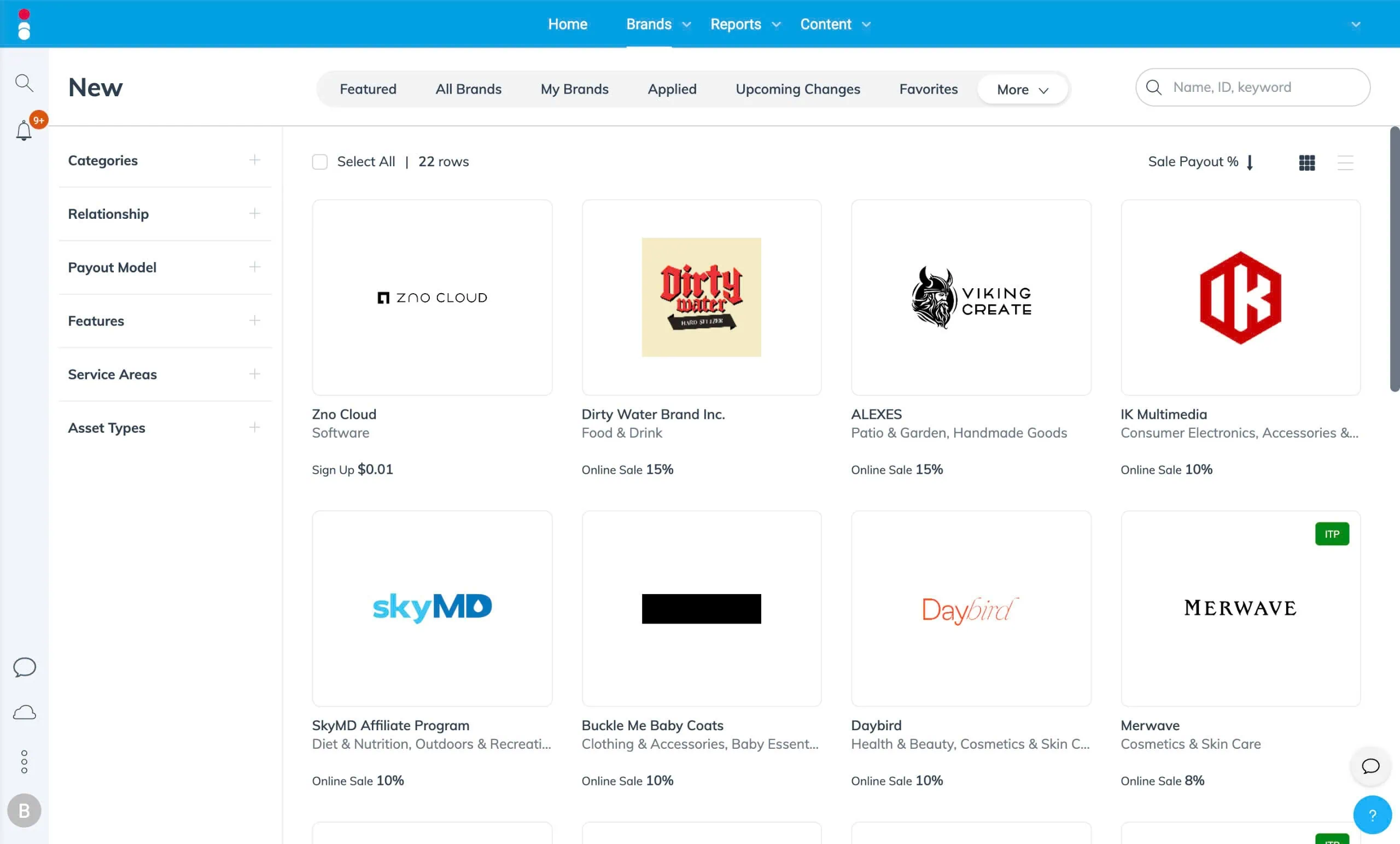
After doing market research on competitors, you can decide on the commission rates you should provide. Based on your product prices and profit margins, it could be:
- Percent of sale: a percentage of the affiliate’s total revenue, e.g., 20% of the total order amount.
- Flat rate per item: the number of product units sold. E.g., $10 per item.
- Flat rate per order: a fixed amount on each referral order, e.g., $15 per order.
However, a basic commission level is not enough to motivate affiliates. You can encourage them to refer more by building a dynamic commission structure based on affiliate performance. Simply put, the more sales affiliates generate, the higher commission they receive.
Use this tactic effectively like Saledress
Saledress, an international online fashion store, relies on UpPromote, the #1 Shopify affiliate software trusted by experts and over 115,000 global customers, to set up an auto-tier commission structure. This approach makes their affiliate program even more enticing.

The brand offers three levels: Silver, Gold, and Platinum. Commission rates range from 8% to 10%, along with other great perks. Each time affiliates hit their sales targets, they automatically move to a higher tier with better commissions.
And the results? Saledress built a team of around 5,000 affiliates and generated over 30,000 orders in just 1.5 years.
Activate UpPromote’s powerful settings to set a compelling commission rate that affiliates won’t want to miss!
Within the UpPromote dashboard, navigate to Program > Auto-tier Commission.
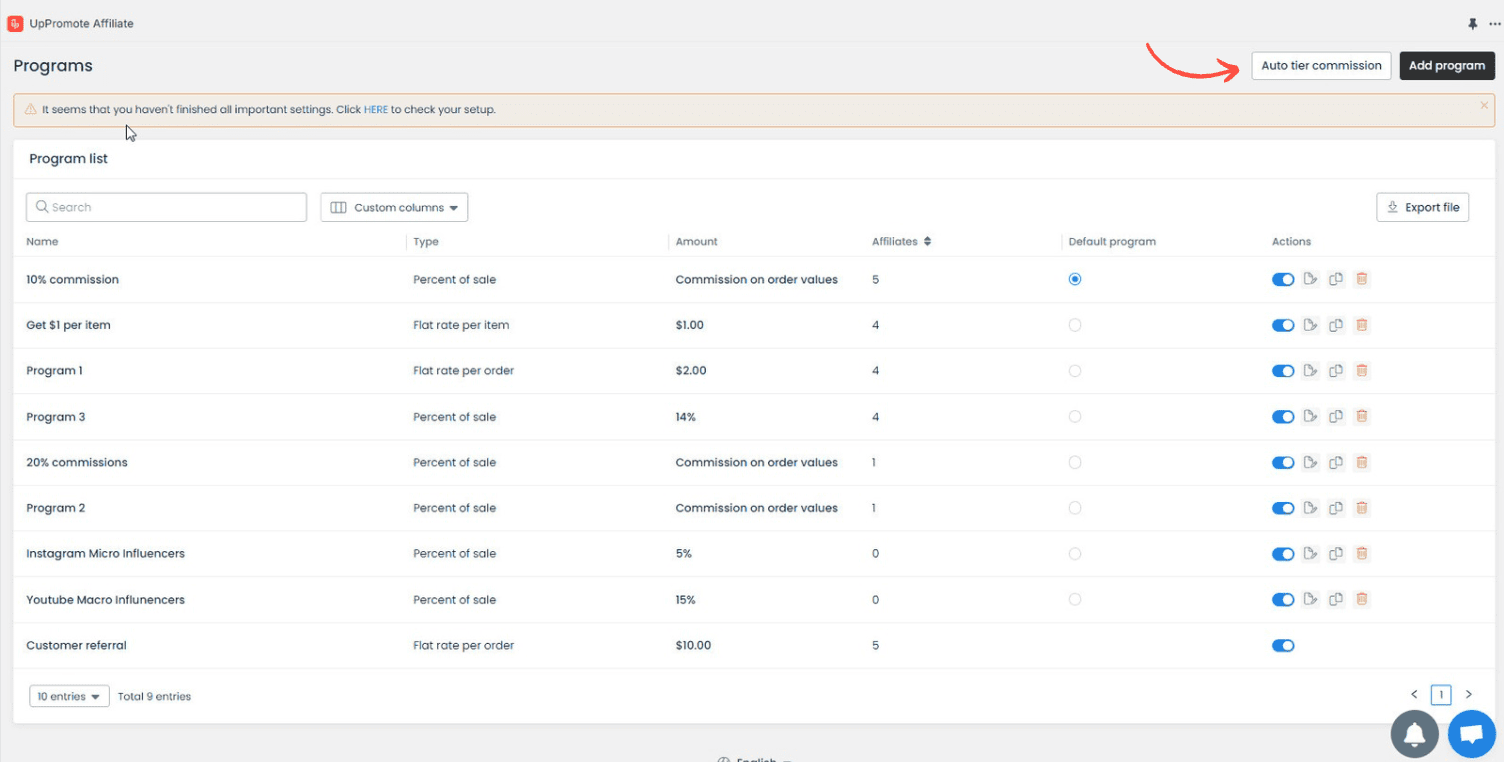
Our affiliate marketing system lets you build auto-tier commission rules. You can base them on referral sales, earned commissions, and referral quantity.
For instance, you set the condition to be to the total sales of referrals and set three different levels as below:
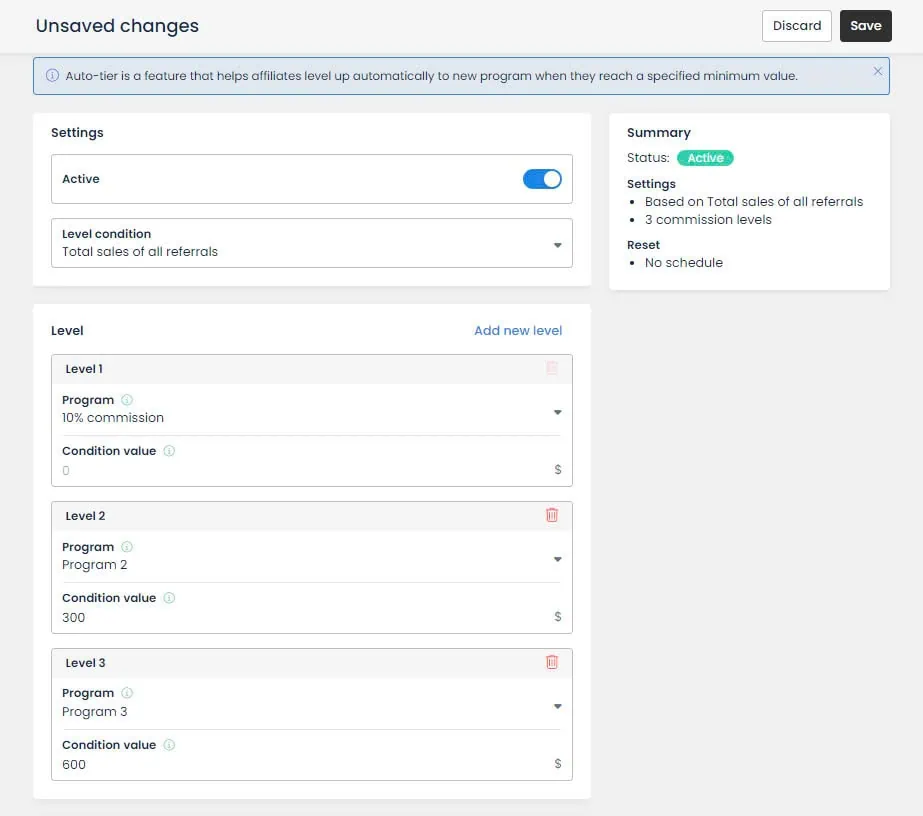
In this setup:
- Affiliates who have less than $300 in total referral sales (only sales with approved commissions count) will remain in program 1.
- Those who earn $300 in total sales will automatically move to program 2.
- Likewise, they will move to program 3 once they earn $600 in total sales.
Build Programs for Categorized Affiliates
If you’re just starting out with managing affiliates, you might think they’re all similar—mostly publishers who help promote your products to their audience.
However, affiliates can be different, such as influencers, content affiliates (like bloggers, content creators, and vloggers), review sites, satisfied customers, or others.
Each type of affiliate group has a different experience, audience volume, and performance. So, not all affiliates get the same commission rates based on these factors. You can consider classifying your affiliate partners and creating separate programs to fit each group.
Learn from Amazon’s strategy
Amazon categorizes its affiliates based on the type of content they create and the platform they use:
- Content Creators: These are bloggers, vloggers, and website owners who share product reviews, recommendations, and other content on their platforms. They can sign up for the Amazon Associates Program to promote products and earn commissions.
- Influencers: Social media influencers can participate in the Amazon Influencer Program, which allows them to create personalized Amazon storefronts and curate lists of recommended products for their followers.
- App Developers: Those developing mobile apps can benefit from the Amazon Mobile Associates Program, integrating Amazon products into their apps and earning commissions from in-app purchases.
Each group receives specialized tools, support, and incentives tailored to their specific needs. This strategy helps Amazon optimize its affiliate marketing efforts, ensuring that every affiliate partner is well-supported and motivated.
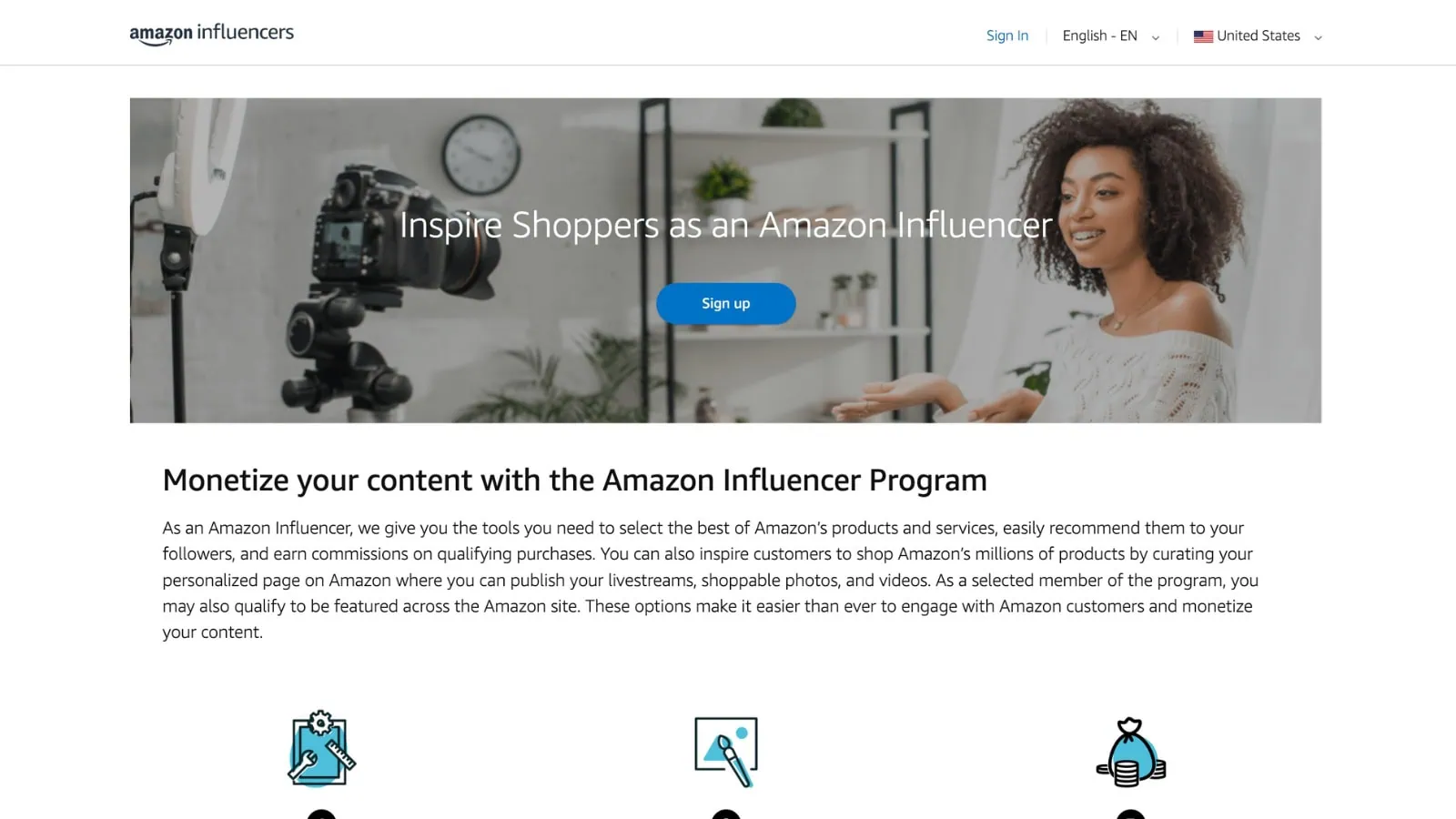
Creating and managing a single affiliate program may seem straightforward, but handling multiple affiliate campaigns can be challenging. That’s where UpPromote comes in—the top recommended Shopify affiliate software that simplifies these tasks.
Simply connect your store with UpPromote, and navigate to Programs > Add Program. Then, you can easily tailor programs to different affiliate groups right away.

Convert Happy Customers to Affiliates
Looking to boost your sales? Have you thought about turning your happy customers into affiliates who can help spread the word about your products?
It’s no secret—92% of people say they trust recommendations from friends and family when deciding what to buy. So, imagine the impact of a satisfied customer who’s excited to share your products with their social media followers or within their personal circles.
There’s really nothing better than a genuine recommendation from someone who already loves what you offer. This kind of word-of-mouth promotion can help you earn big.
But how can you make this happen? The answer lies in creating a customer referral program. Simply put, you encourage existing customers to refer new buyers to your business in exchange for incentives.
Examples for you to explore
In fact, turning happy customers into promoters has become a key part of many brands’ sales and marketing strategies. These brands have leveraged their customer base by offering bonuses to those who successfully promote their products.
For examples:
- Wise (formerly TransferWise) motivates users to refer friends by offering rewards. When a user refers to a friend, the friend’s first transfer fee is waived for up to £500. In return, the referrer earns up to £75 after three friends sign up and make transfers of over £200.

- ASOS, a popular fashion brand, uses this strategy too. Customers who recommend the store to friends receive a 20% discount on their next order. Meanwhile, their friends enjoy 20% off their first purchase.

Interested in turning your customers into promoters to boost sales? UpPromote, the all-in-one referral and affiliate marketing software on Shopify, can help.
To enable the robust feature in UpPromote, navigate to Outreach > Affiliate recruitment > Customer referral > click Set up.
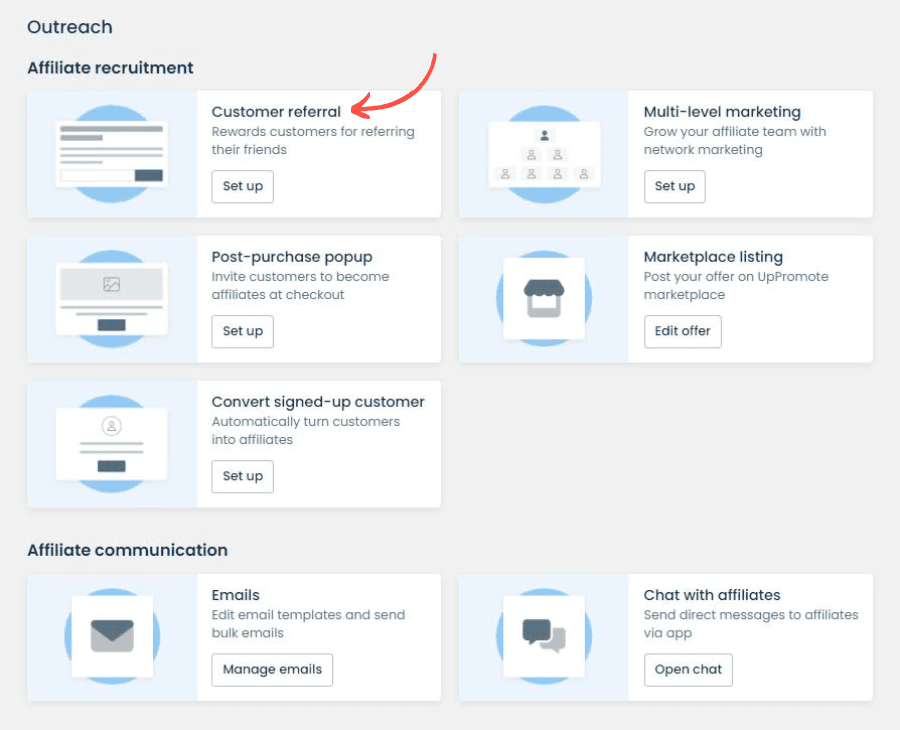
Our system allows you to create a form (widget or page) on your website. It looks like this:
- Widget: Appears on your website as a floating button.
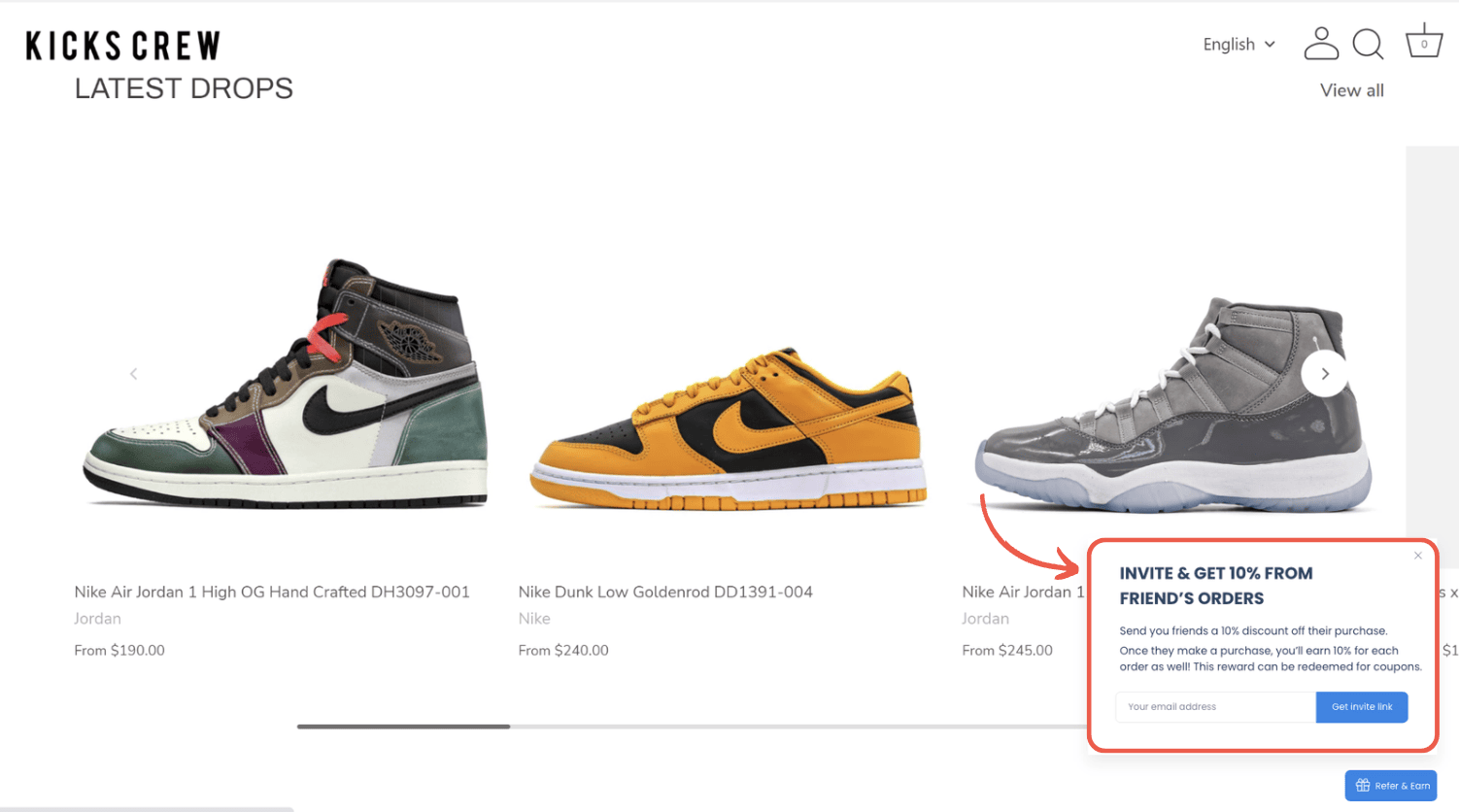
-
Landing page: Displays as a signup form for customers on any page of your store.

With this setup, your customers can easily sign up for your referral program and get their referral link to start promoting your products instantly.
Turn delighted customers into brand ambassadors to drive more sales with UpPromote.
Combine Affiliate Programs with Exclusive Deals
Everyone loves discounts, including your customers.
Did you know that 83% of shoppers choose what to buy because of discounts and 97% of US consumers (Mediakix) always look for deals when they shop?
Don’t overlook how discount codes can encourage customers to make a purchase. So, think about giving your affiliates special discounts and exclusive deals. It could be the perfect extra for them to share your products and get more people to buy.
See how PrettyLittleThing do
PrettyLittleThing, a UK-based favorite fashion brand for women, knows how to make the most of this affiliate marketing tactic.
The brand loves teaming up with influencers to showcase its latest collections on social media. Beyond just providing affiliate links for their posts and stories, PrettyLittleThing goes the extra mile by giving them exclusive discount codes.
These special codes, unique to each influencer, let their followers enjoy great deals when they shop on the PrettyLittleThing website. This strategy not only boosts sales but also strengthens the connection between the brand and the influencers.

Of course, you can generate multiple discount codes for your affiliates. But how can you track, manage, and ensure all these codes work effectively? That’s why you need proper affiliate tracking software to help.
UpPromote, the most-entrusted Shopify affiliate tracking app, enables you to track referrals using coupons instead of affiliate links. When customers use the assigned coupon at checkout, we automatically calculate the affiliates’ commissions.
To turn on the Tracking by coupon feature, go to Settings > Affiliate link & coupon > Activate Tracking by coupon.
![]()
You can easily create a discount code in the app and assign it to a specific affiliate. Select the affiliate you want to give the new coupon to. Then, set up the details, such as the coupon name, discount type, value, and usage limits.
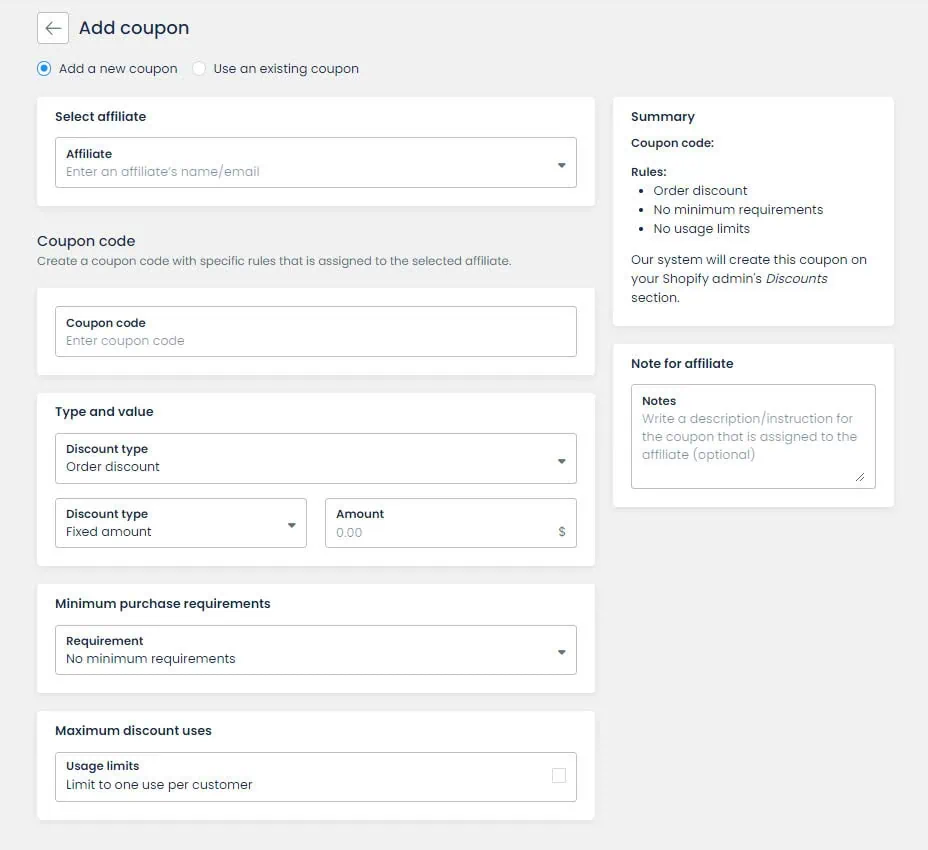
But there’s more.
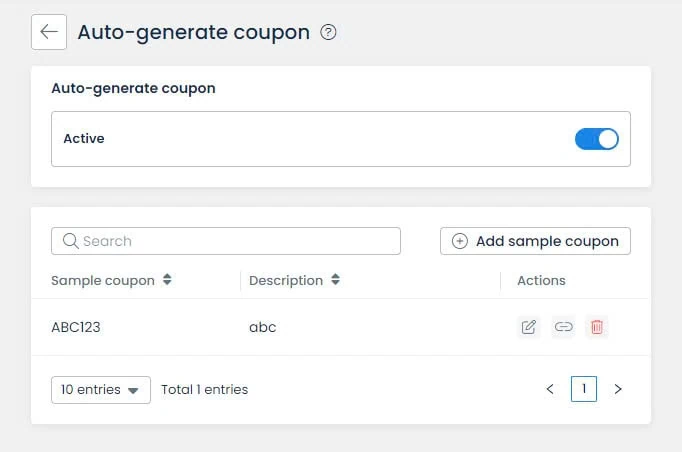
You can use the Auto-generate coupon function to make things quicker and easier. Just choose the programs you want and pick a format for the coupon name (like the affiliate’s name, random letters, or another option) to finish the setup.
Join 115,000+ UpPromote’s users to generate exclusive coupon codes that excite both affiliates & customers!
Focus on Peak Shopping Seasons
Leveraging peak buying seasons is one of the best affiliate marketing strategies for merchants to boost sales. The reason is these periods typically see a significant increase in consumer spending.
You can consider tying in your affiliate marketing campaign with peak shopping seasons, such as:
- Black Friday and Cyber Monday
- Christmas and New Year’s
- Summer sales
- Back-to-school seasons
- Valentine’s Day
- Mother’s and Father’s Day
During peak shopping seasons, competition is high. So, you need some tactics to make your plan work efficiently:
- Identify key shopping seasons relevant to your products. Develop a marketing calendar that outlines when these peak times occur, and plan your affiliate promotions well in advance.
- Provide attractive incentives to affiliates. This can motivate them to prioritize your products. Consider temporary commission increases or bonuses for top performers.
- Create special offers that are only available during these peak times. Exclusive deals can create urgency among shoppers and give your partners a compelling reason to promote your products.
Explore Gymshark’s tactic
Gymshark, a fitness apparel brand, is a great example of a business that leverages peak shopping seasons effectively through its affiliate program.
Normally, the brand offers affiliates a discount code that gives customers 10% off full-priced items. However, during Black Friday and the Summer Sale, Gymshark provides affiliates with early access to promotional materials and extra great deals, motivating them to push these products better.

Create Giveaways to Drive Customer Engagement
Hosting a giveaway not only gives your affiliates a fun and engaging way to promote your brand, but it also adds a spark of excitement to their efforts.
Imagine your partners sharing the thrill of your giveaway with their followers, encouraging them to visit your site or social channels, and creating a buzz that everyone wants to be a part of.
The chance to win something can really motivate people. It might push them to sign up for your email list, make that purchase they’ve been thinking about, or start following you on social media.
By working together with your affiliates in this way, you can reach even more people. This could introduce your brand to new customers who haven’t heard of you before.
Are you interested in how GoPro does it?
GoPro shows how powerful giveaways can be in boosting affiliate marketing.
Known for its action cameras, GoPro often teams up with influencers, vloggers, and content creators to organize giveaways, giving people the chance to win GoPro cameras and gear.
These campaigns not only get people excited and involved but also help drive sales by spreading the word through videos and social media. It’s a fun and effective way for GoPro to connect with its audience and expand its reach.

To combine giveaways smoothly with your affiliate campaigns, keep some points in mind:
- Select a prize that is relevant to your target audience and attractive enough to generate excitement. It could be your products, a gift card, or even a cash prize.
- Set clear rules and guidelines regarding giveaways. For example, determine the entry requirements, such as signing up for a newsletter, following your brand on social media, or making a purchase.
- Once the giveaway is over, announce the winner(s) publicly and thank all participants for their involvement.
- Track and measure the giveaway’s effectiveness. Calculate the number of entries, the traffic driven by affiliates, and any resulting sales or leads.
- Follow up with affiliates to gather feedback and discuss the campaign’s results. This will help you refine your strategy for future giveaways.
Run Contests to Enhance Affiliate Performance
An affiliate contest is like a race. It creates a sense of competition among affiliates, encouraging them to put in extra effort to win rewards.
The main goal of the contest is to generate as many sales as possible within a set time frame. You then measure affiliates’ results and award a big prize to the best performers.
Simply put, organizing a contest motivates your partners to perform at their best. It also helps you drive more sales and increases affiliates’ engagement with your program.
How does another brand host a contest?
Many brands apply this affiliate marketing strategy to grow their sales.
Take CrakRevenue, a well-known CPA (Cost Per Action) network, as an example. The brand usually conducts affiliate contests to motivate affiliates and reward them for their performance.
These contests are usually based on specific performance goals, like the amount of revenue generated during a certain period. Affiliates are ranked on a leaderboard, and those who finish at the top when the contest ends get the biggest prizes.
But CrakRevenue doesn’t just reward the top performer—the brand also recognizes other high-achievers, which encourages more people to get involved.
In addition to cash, CrakRevenue might also offer exclusive gifts or bonuses, such as tech gadgets, travel packages, or even higher commission rates for a limited time.

Encourage Repeat Purchases with Store Credit
If you’re new to affiliate marketing, you might initially think that paying affiliates in cash is the only option. But there’s another way.
You can reward them with store credit. Rather than receiving cash, your affiliates get credits as their commissions to use within your store.
So, why can this approach help boost your sales? Because affiliates can use their credits to redeem your products or services. It’s not just a unique way to reward them—it also encourages them to reinvest in your brand.
Here’s what you can gain from this strategy:
- Affiliate shopping at your store helps build brand loyalty.
- It’s more cost-effective than cash payments, keeping money within your business and potentially easing cash flow.
- It drives more traffic and sales to your store, as affiliates are motivated to spend their credits.
A real example to copy from
Holbrook Pickleball chose store credit as a part of its affiliate marketing strategy. The brand works with UpPromote, the top-rated affiliate software on Shopify, featuring a 4.9/5 rating and over 4,000 reviews, to enable this feature.
Holbrook invites pickleball fans to join as ambassadors. Once signed up, affiliates receive a unique code to share with their friends and followers.
Every time someone uses that code, the ambassador earns a 15% store credit. This approach doesn’t just bring customers back—it also builds a deeper connection and loyalty to the brand.
And what’s the outcome? Holbrook Pickleball wrapped up 2023 with an impressive 87% boost in orders, attributed to its ambassador program.

Want to duplicate Obagi’s success? Try UpPromote for FREE today.
To activate Store Credit within UpPromote, go to Settings > Payment > Payment settings > Select Store Credit. You can select specific programs that offer this payment option.
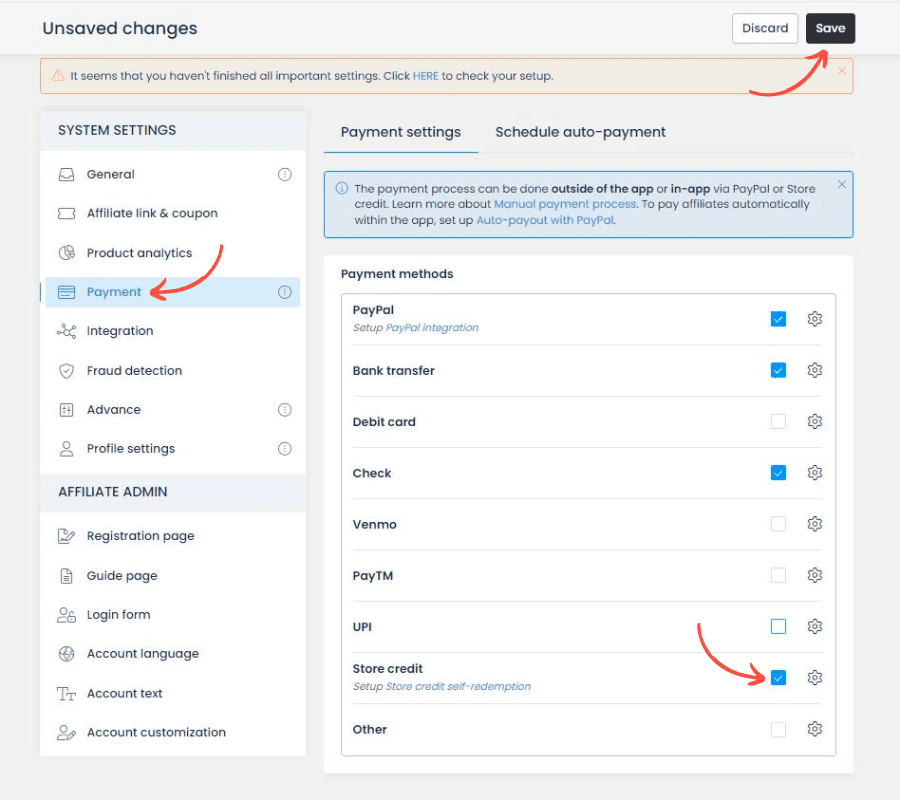
With our affiliate marketing management system, you can let your partners generate their own coupons by turning on Store Credit self-redemption while setting up. You can set the maximum and minimum redeemable amount of a coupon an affiliate can create.
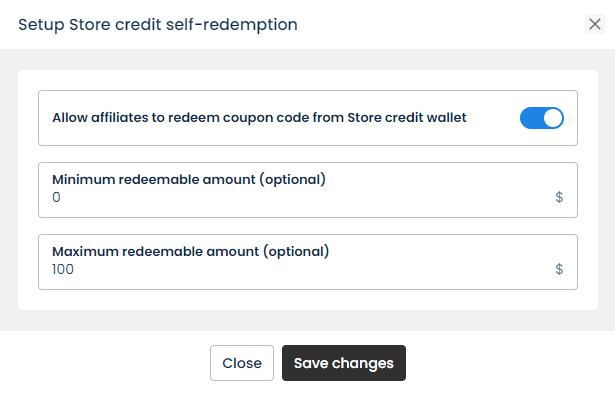
Make Informed Decisions with Real Data
Simply launching your affiliate program will not yield results overnight. To make your campaign successful and boost sales, you need to monitor performance data closely and continuously improve.
By watching key metrics, you can identify trends and see what’s working and what isn’t. From there, you can adjust your program and allocate resources more effectively.
For getting real-time insights, using an affiliate tracking platform with accurate tracking methods and detailed reports on affiliate performance can work wonders.
What about other businesses?
Holbrook Pickleball remains a key example of how to make this affiliate marketing strategy effective.
They don’t just set a sales goal and sit back, hoping their ambassadors will reach it. Instead, they stay closely connected, tracking their ambassadors’ sales with UpPromote’s analytics dashboard.
When an affiliate goes above and beyond, Holbrook shows their appreciation by surprising top performers with gift packages, easily sent through UpPromote’s gift feature. It’s a meaningful way to say ‘thank you’ for their hard work and dedication.
By keeping an eye on real-time data, Holbrook can send timely incentives that keep their affiliates motivated and excited to promote their products. And the results speak for themselves: Affiliate revenue grew by an impressive 86% in just one year.
With UpPromote, you can see real-time data on how your affiliates are performing.
Our system displays key metrics like the number of affiliates, orders, sales, clicks, and commissions using different types of graphs. You can also filter this data by program and date.
Besides that, you can easily spot your top affiliates and the most popular products. To check how each affiliate is doing, just look at the Top Affiliate board on the Dashboard. UpPromote allows you to download these reports in various formats, including Excel, CSV, PDF, and more.

Pick the Best Affiliate Marketing Strategy for Your Business
Choosing the right affiliate marketing strategy for your business can make a big difference.
The key is to match the strategy with your business goals, target audience, and the products or services you offer.
Here are some tips to help you pick the best tactic for your brand:
Align Strategies with Your Business Goals
To make the most out of your affiliate program, start by aligning your strategies with your business objectives.
Are you looking to:
- Boost sales and increase revenue? Focus on offering special promotions or exclusive deals through affiliates to impact your sales and revenue directly. Pay attention to busy shopping seasons to maximize your chance to sell more products. Or don’t forget the idea of running a contest among affiliates to motivate them to bring more sales.
- Drive traffic and expand brand awareness? You can collaborate with content creators or influencers who can attract a large audience to your site. Give them special giveaways to help you achieve just that.
- Expand your affiliate team? Recruit more affiliates by offering appealing incentives or running refer-a-friend campaigns that encourage existing customers to be your brand promoters.
- Optimize your program? Regularly use data to optimize your strategy. Adjust commissions and promotions based on performance metrics to ensure your program stays effective.
Tailor Strategies to Your Business Type
Every business is unique, and your affiliate marketing strategy should reflect that. Adjusting your affiliate marketing strategy to your specific business type can significantly enhance your results.
For B2C (Business to Consumer): Concentrate on some consumer-oriented tactics, such as teaming up with social media influencers or turning happy customers into affiliates.
For B2B (Business to Business): Implement strategies tailored to B2B companies, including forming industry partnerships, engaging in professional networks, and offering high-value incentives.
For small businesses and entrepreneurs: Utilize cost-effective, grassroots strategies like local influencer marketing, customer referral programs, and leveraging existing customer bases.
Choose the Right Strategy for Your Product Type
The type of products you offer will influence which affiliate marketing strategies work best. It’s important to pick a strategy that complements your products.
For example:
If you sell physical products:
- Partnering with affiliates who have a strong presence in your niche is often effective. Consider working with influencers, bloggers, or review sites that cater to your target audience. Think about promoting tangible items through product reviews or unboxing videos. These are perfect ways to showcase the product’s features.
- Offering affiliates the option to provide exclusive discount codes or promotions can also help drive sales and increase brand visibility.
- Using store credit is also a good choice for your brand.
When it comes to digital products, such as software or online courses:
- Work with affiliates who can create in-depth tutorials, reviews, or case studies. These publishers can demonstrate the value of your product, making it easier for potential customers to see the benefits and make a purchase.
- Use digital-specific tactics, such as offering free trials, special discounts during holidays, and email campaigns to promote your products.
For subscription services:
- Focus on long-term customer retention. Consider offering recurring commissions to incentivize affiliates to bring in and retain subscribers.
- To attract and retain your customers, think about providing discounts such as a free trial period, a first-time subscriber discount, or a discounted annual subscription.
Wrapping up
Choosing the right affiliate marketing strategy is crucial for your business’s success. It will help you run a powerful program that drives growth and increases sales.
While you can combine different tactics in your campaign, it’s essential to align them with your business goals, tailor them to your business type, and select the best approach for your products.
Whether your aim is to increase traffic, boost sales, or grow your affiliate network, staying connected with your affiliates and making data-driven decisions will keep your program on track. Consider using affiliate management software with robust features that can support your efforts.
Remember, the heart of a successful affiliate program lies in understanding your audience, staying flexible, and continually improving your approach. With the smart strategies in place, your affiliate program can become a powerful tool for long-term growth.








